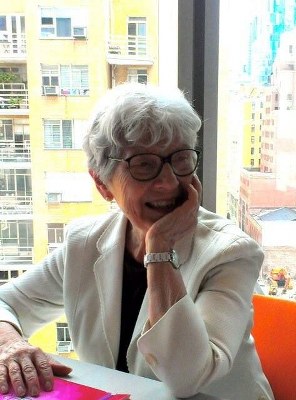Please Share


Who Would You Choose?
Love in the City Book 4
by J.M. Bronston
Genre: Contemporary Romance

Marge Webster has always known what she wanted, and how to accomplish it.
As editor-in-chief of
Lady Fair magazine,
she’s got influence and fame, a social calendar as packed as her
closet, and a gorgeous attorney boyfriend. Jerry is successful,
loving, and ready to settle down. As for Marge—she just feels
exhausted. Maybe that explains her weak knees and fluttering
heartbeat when she runs into Sam Packard, her high-school crush.
Back then, Sam was the most popular and charismatic guy around. He
didn’t
always understand Marge’s dreams, but their connection was
undeniable. Marge isn’t that awestruck girl anymore—but for the
first time in her life, she has no idea which path to follow. Maybe
the answer is to step back, take a doctor-ordered European vacation,
and explore exactly what and who makes her happy. The answers might
surprise everyone—especially Marge…
didn’t
always understand Marge’s dreams, but their connection was
undeniable. Marge isn’t that awestruck girl anymore—but for the
first time in her life, she has no idea which path to follow. Maybe
the answer is to step back, take a doctor-ordered European vacation,
and explore exactly what and who makes her happy. The answers might
surprise everyone—especially Marge…
**can easily be read as a standalone**


Joan Myra Bronston
grew up in New York City, married her college sweetheart, and
went with him to Germany for a year while he was in the Army and
where she worked as a telex operator and mail clerk. They then moved
to Austria where Joan spent five years teaching at an international
school. She is the mother of three wonderful girls and the
grandmother of a super-wonderful grandson. Joan was also a secretary,
social investigator, and psychiatric researcher, before entering law
school and eventually becoming a corporate attorney. In addition to
her years in Europe, Joan has lived in Pittsburgh, Chicago, and, for
18 years, Salt Lake City. At last, she has closed the circle and
returned to her first and most beloved—New York City.

It was just too good a day not to be outside in the sun. The retailers’ meeting had gone really
well and ended early with smiles all around. She was ahead of schedule for her lunch appointment
and the city was inviting her to come out and breathe a little.
“Luke. Stop the car.” She looked at her watch—a gift from Hermès—and said, “I have some
time. I’m going to walk from here. You go on to the restaurant and wait for me till it’s time to go back
to the office.”
“Okay, Ms. Webster.” Before Marge could move, Luke was out of the car and came around
to open the door for her. “Nice day for a walk,” he said. “Summer’s winding down. It’ll be fall soon.”
“Yes.” She smiled. “You can feel it in the air.” It seemed, despite Piero Massione’s childish
behavior, the world was full of smiles now.
“You sure can. Need to enjoy what’s left of the good weather.” Luke smiled, too. “Have a
good one,” he said, and he got back into the car.
Marge watched the big black town car blend in with the rest of the traffic—the moving mass
of other big black town cars and boxy yellow taxis, the private cars, the buses, and the trucks that
made the city feel
always on the go.
She turned away and smiled again; she’d just slipped out of the day’s tightly packed
schedule and found a little escape time just for herself. It didn’t happen often. It certainly didn’t
happen often enough. She really needed just a small escape—needed to get away from her mental
to-do list. She took one big, deep breath and looked around, looked to see where she had landed.
It was an ordinary neighborhood street, somewhere in the Village. Small shops, some
brownstones, people just quietly going about their business. Babies in strollers. Dogs being walked.
Teenagers falling in love. A city street. Always a treat. Better than any television screen for variety,
humanity, action, the potential for drama, a laugh, something new.
She took off her jacket, hooked it over her arm and started to walk. A man passed her,
turned to look, and kept going. At the corner, a street vendor was filling the air with the irresistible
aroma of honey roasted nuts. She paused at his cart, checked her watch once more—forty minutes
till she had to meet Bridey—decided she could indulge in a snack before lunch. She paid her dollar
and started to walk away with her paper bag of honey roasted peanuts. But an idea stopped her.
She turned and watched as a mother and her little boy approached the cart. The mother gave her
boy the money to buy a bag. And Marge thought about it.
Street food in New York. Surprisingly, it really is very good. Good, and often very interesting.
Might be an idea to discuss with Bridey. See what she thought of a piece on the street food of New
York. It would make an amusing story. “What to Wear While Dining Out.” With the emphasis on
“out,” of course.
Always new ideas. Can’t help it. I just love the magazine so much.
She really needed to take more breaks like this one.
I know. I know. Doctor Diaz says I have to ease up a little. Working too hard.
She did a little deep breathing, quietly, as she walked along. Marge would never let anyone
know, but it was beginning to worry her. Carrying it all on her shoulders. She was feeling the stress,
she was seeing the
signs of overwork, the wound-up overdrive of her thoughts that kept her from falling asleep. The little
wrinkles forming at her lips. The need for concealer under her eyes.
But who would—who could—run Lady Fair as skillfully as she did? Marge knew it was her
ability to be the calm in the eye of the storm that was her major asset—that had gotten her hired for
this job at the impossibly early age of twenty-nine.
She’d first come to the notice of the magazine’s owners early on, when she was a young
features editor, first months on the job, and an article of hers won an ASME award. Not bad for a
rookie. Not bad for anyone! Then, a month later, there was her memo to upper management
suggesting a cost-cutting digital innovation that resulted in an annual bottom-line savings of more
than eighty thousand dollars. And the clincher came the day a crazy ex-con broke through the lobby
security downstairs and ran naked through Lady Fair’s reception area, waving a long Tanaka knife.
While the receptionist cringed behind her chrome and glass desk, paralyzed with terror, and the stafftrembled in the corridors and behind their locked doors, it was the still-a-rookie Marge whose gentle
and sympathetic voice talked the man down and kept him quiet until the police arrived to escort him
out of the building, wrapped up in a gorgeous blue floral wool-and-silk
shawl from Gucci, produced at the last minute by one of the design people, out of the nearest
fashion closet.
When an ABC reporter did the interview about the incident for the evening news, Marge
credited the outfit she’d been wearing. “It was probably the charcoal gray Valentino I had on. It’s a
very no-nonsense business suit, suitable for handling any office crisis. Maybe,” she added, “he
thought I was his parole officer.”
But it wasn’t only Marge’s steel in the face of danger together with her light touch that got her
noticed. She was a brilliant writer, knew how to work to a deadline, and understood the difference
between a good story and an indispensable story. She’d proven she understood the dollars and
cents of the industry, and she had a respect for its full product range from the low end of a strip
mall’s ready-to-wear to the haute couture of the most exclusive salons. And, perhaps the most
important skill in a potential editor in chief, Marge had not only a passion for fashion but a sure
sense of its exact place in today’s social scene as well as in the scene that would appear over
tomorrow’s horizon.
What no one included in the mix, not even Marge herself, was what it was costing her to be
cool and effective, day in and day out. No one, that is, except Dr. Martine Diaz who had been telling
her to take it easier.
well and ended early with smiles all around. She was ahead of schedule for her lunch appointment
and the city was inviting her to come out and breathe a little.
“Luke. Stop the car.” She looked at her watch—a gift from Hermès—and said, “I have some
time. I’m going to walk from here. You go on to the restaurant and wait for me till it’s time to go back
to the office.”
“Okay, Ms. Webster.” Before Marge could move, Luke was out of the car and came around
to open the door for her. “Nice day for a walk,” he said. “Summer’s winding down. It’ll be fall soon.”
“Yes.” She smiled. “You can feel it in the air.” It seemed, despite Piero Massione’s childish
behavior, the world was full of smiles now.
“You sure can. Need to enjoy what’s left of the good weather.” Luke smiled, too. “Have a
good one,” he said, and he got back into the car.
Marge watched the big black town car blend in with the rest of the traffic—the moving mass
of other big black town cars and boxy yellow taxis, the private cars, the buses, and the trucks that
made the city feel
always on the go.
She turned away and smiled again; she’d just slipped out of the day’s tightly packed
schedule and found a little escape time just for herself. It didn’t happen often. It certainly didn’t
happen often enough. She really needed just a small escape—needed to get away from her mental
to-do list. She took one big, deep breath and looked around, looked to see where she had landed.
It was an ordinary neighborhood street, somewhere in the Village. Small shops, some
brownstones, people just quietly going about their business. Babies in strollers. Dogs being walked.
Teenagers falling in love. A city street. Always a treat. Better than any television screen for variety,
humanity, action, the potential for drama, a laugh, something new.
She took off her jacket, hooked it over her arm and started to walk. A man passed her,
turned to look, and kept going. At the corner, a street vendor was filling the air with the irresistible
aroma of honey roasted nuts. She paused at his cart, checked her watch once more—forty minutes
till she had to meet Bridey—decided she could indulge in a snack before lunch. She paid her dollar
and started to walk away with her paper bag of honey roasted peanuts. But an idea stopped her.
She turned and watched as a mother and her little boy approached the cart. The mother gave her
boy the money to buy a bag. And Marge thought about it.
Street food in New York. Surprisingly, it really is very good. Good, and often very interesting.
Might be an idea to discuss with Bridey. See what she thought of a piece on the street food of New
York. It would make an amusing story. “What to Wear While Dining Out.” With the emphasis on
“out,” of course.
Always new ideas. Can’t help it. I just love the magazine so much.
She really needed to take more breaks like this one.
I know. I know. Doctor Diaz says I have to ease up a little. Working too hard.
She did a little deep breathing, quietly, as she walked along. Marge would never let anyone
know, but it was beginning to worry her. Carrying it all on her shoulders. She was feeling the stress,
she was seeing the
signs of overwork, the wound-up overdrive of her thoughts that kept her from falling asleep. The little
wrinkles forming at her lips. The need for concealer under her eyes.
But who would—who could—run Lady Fair as skillfully as she did? Marge knew it was her
ability to be the calm in the eye of the storm that was her major asset—that had gotten her hired for
this job at the impossibly early age of twenty-nine.
She’d first come to the notice of the magazine’s owners early on, when she was a young
features editor, first months on the job, and an article of hers won an ASME award. Not bad for a
rookie. Not bad for anyone! Then, a month later, there was her memo to upper management
suggesting a cost-cutting digital innovation that resulted in an annual bottom-line savings of more
than eighty thousand dollars. And the clincher came the day a crazy ex-con broke through the lobby
security downstairs and ran naked through Lady Fair’s reception area, waving a long Tanaka knife.
While the receptionist cringed behind her chrome and glass desk, paralyzed with terror, and the stafftrembled in the corridors and behind their locked doors, it was the still-a-rookie Marge whose gentle
and sympathetic voice talked the man down and kept him quiet until the police arrived to escort him
out of the building, wrapped up in a gorgeous blue floral wool-and-silk
shawl from Gucci, produced at the last minute by one of the design people, out of the nearest
fashion closet.
When an ABC reporter did the interview about the incident for the evening news, Marge
credited the outfit she’d been wearing. “It was probably the charcoal gray Valentino I had on. It’s a
very no-nonsense business suit, suitable for handling any office crisis. Maybe,” she added, “he
thought I was his parole officer.”
But it wasn’t only Marge’s steel in the face of danger together with her light touch that got her
noticed. She was a brilliant writer, knew how to work to a deadline, and understood the difference
between a good story and an indispensable story. She’d proven she understood the dollars and
cents of the industry, and she had a respect for its full product range from the low end of a strip
mall’s ready-to-wear to the haute couture of the most exclusive salons. And, perhaps the most
important skill in a potential editor in chief, Marge had not only a passion for fashion but a sure
sense of its exact place in today’s social scene as well as in the scene that would appear over
tomorrow’s horizon.
What no one included in the mix, not even Marge herself, was what it was costing her to be
cool and effective, day in and day out. No one, that is, except Dr. Martine Diaz who had been telling
her to take it easier.




I look forward to reading this book!